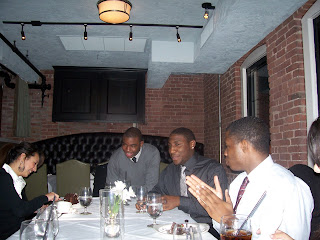 "It has arrived! The semester has finally come to an end, and with it a whole lot of reflections. It is always wise to allow ourselves to take a moment and reflect back on the semester up to this point in order to improve if necessary.
"It has arrived! The semester has finally come to an end, and with it a whole lot of reflections. It is always wise to allow ourselves to take a moment and reflect back on the semester up to this point in order to improve if necessary.It is impossible to reflect back on the past three months without taking notice of our historic presidential election. And so I begin my reflection with a quotation from our president-to-be, Barack Obama. It reads:
"Change will not come if we wait for some other person or some other time. We are the ones we've been waiting for. We are the change that we seek."
This excerpt is very truthful in that it allows for our minds to wander and think of the possible changes that we are capable of making. Young people are often associated with having poor awareness of society and are often characterized as careless individuals, as my American Government professor would reiterate. Observation and criticism are always in effect from older people and we often serve as targets of misjudgment. Despite these stereotypes, we have proven to be a driving force behind the outcome of the presidential election last month.
According to a recent article, entitled, "Youth vote may have been key in Obama's win" written by MSNBC.com's Melissa Dahl, the record turnout of the youth vote may have had a big impact on the results. Dahl affirms that "young voters preferred Obama over McCain by 68 percent to 30 percent- the highest share of the youth vote obtained by any candidate since exit polls began reporting results by age in 1976." This is a mind-changing turnout. Any citizen who witnessed the progress of the elections had to have witnessed the eagerness and fervor of those who cast their votes.
Personally, I had the opportunity to witness my fellow peers campaign for their candidate and carry out debates in dormitories and other social places around campus. The desire to seek change in our political sphere and to have our voices heard in relation to distinct social issues brought about the record breaking number of votes. Every checkmark signified a determination to seek out change.
This did not only include the presidential election, but also issues which have arisen in our communities, issues such as Question 1, regarding the Massachusetts State Income Tax Repeal, which aimed at ending the current 5.3 percent income tax on wages, interest, dividends, and capital gains. This decision would have had a major effect on young people per se, since there would have been a decrease in funding for education, an increase in class sizes, and cuts for after-school programs. Luckily we were able to overturn that decision, and it will not affect our communities as much. This serves as an illustration of the power not only of the youth vote, but also the vote of everyone in accord.
The ability to know our strength as dynamic individuals has made a historic impact on the past election. We can now rejoice and continue to be attentive to the decisions that will affect us all in the near future. This past election has also enabled us to realize the power of hope. Hope is what many young people held throughout the election and what president-elect Obama utilizes in his rhetoric.
With that said, I invite you all to come to our African-Latino-Asian and Native-American Network (ALANA) meetings every Thursdays at 5 p.m. in the Student Activities room. Come experience the power of our open forums, which aim at creating a change within ourselves and communities of how we view the world."
Marely Garcia '11
Community Outreach, ALANA Network










.jpg)



